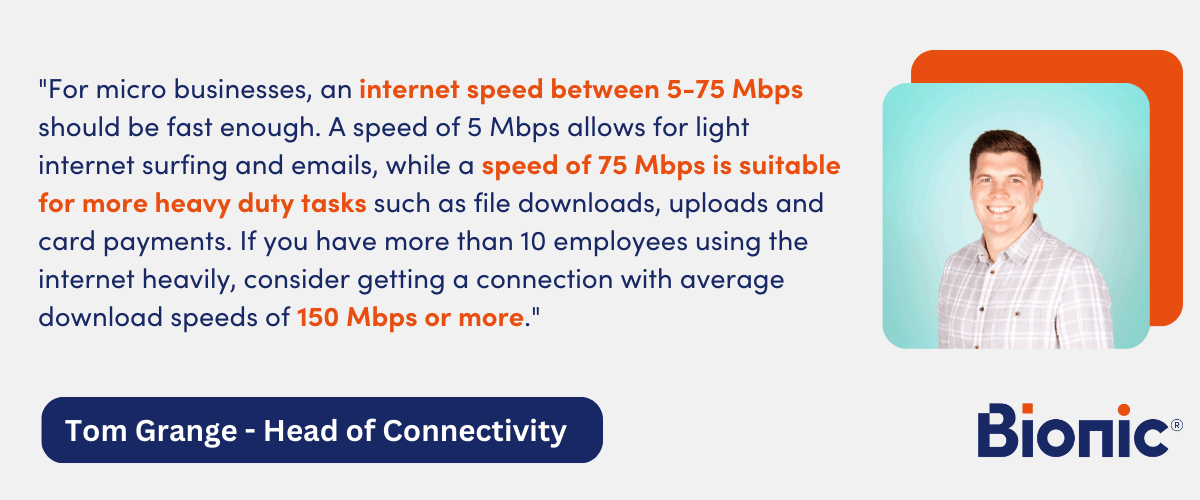What are upload speeds and download speeds?
Internet download speeds and upload speeds can make a big difference to your business, from the speed at which card payments are processed to how many people hang around to use the guest WiFi in your cafe. But what are they? What speeds do you need? And can you do anything to improve them without taking out a new business broadband contract?
We explain all in this guide and offer tips to help you choose the right business broadband with Bionic.
Why does business broadband speed matter?
Broadband speed is a measure of how quickly your internet connection can upload or download data - the faster your speeds, the more efficiently you can work. If your connection speeds are too slow to meet the demands of your day-to-day business, then productivity will suffer.
If you've made the switch to business VoIP, your broadband speeds can also have a big impact on the quality of your voice and video calls. This is because all calls are taken and received over an internet connection, and slower speeds will mean there's a greater chance that your call quality will suffer and may even cut out completely.
This is why it’s important to make sure you’re on the best business broadband package to suit your needs.
How is internet speed measured?
Internet speeds are measured in megabits (Mb) per second. So far, so good. But things can get a little confusing when you consider that eight megabits (Mb) make up one megabyte (MB), which is the measure of data we use to determine file sizes on our computer. For reference, the average MP3 is around 4MB large.
That lowercase ‘b’ really makes all the difference - if you don’t know the distinction it can make advertised speeds seem misleading, so you need to remember that broadband speeds are always measured in megabits (Mb) per second.
When you see a package that advertises download speeds of 40Mb, this means you can download from the internet at a rate of 40 megabits per second, or five megabytes per second. Similarly, if a package advertises upload speeds of 8Mb, this means you can upload to the internet at a rate of 8 megabits per second, or one megabyte per second.
The way you use the internet determines the upload and download speeds you’ll need to do business as efficiently as possible.
What is business broadband download speed?
Download speed is the rate at which information is transferred from the internet to your computer - basically, the greater the download speed, the quicker you can browse the internet, stream music, videos and download files.
If your download speed is too slow, you’ll find even the most basic online activities become frustrating and you’ll struggle to stream content. Internet providers also often slow down your connection speeds if you exceed your monthly download limits, so it’s often best for business users to choose an unlimited plan that doesn’t place a cap on usage.
What is business broadband upload speed?
Upload speed is the rate at which information is transferred from your computer to the internet, which determines how quickly you can send file and upload content online. Upload speeds are often important to businesses, especially those that regularly need to send large files or upload video content, so it’s important to consider how you use this internet when choosing a business broadband package.
Now you know more about internet speeds, the advantages of faster business broadband should be self-explanatory. But before you sign up to any business broadband deal, you need to ask yourself, do you really need the fastest business broadband package?
If your small business only requires the internet for minimal day to day administration work, you could save a packet by downgrading your connection speed and sticking to what you need. Many businesses find themselves drawn onto expensive, high speed packages that you'd only need if you were running a large online operation.

If you're not sure what business broadband connection speed would suit you best, our tech-enable experts are on hand to talk through your all of the available options to find you the best business broadband package. Just enter your postcode or call us now.
How can I boost my upload speed?
There are a few ways you can try to boost your upload speed yourself. The main fixes are:
- Try using a wired connection instead of a wireless one
- Clear any temporary files stored on your computer
- Remove any other devices from your network
- Remove any malware
- Check your settings, disconnect and reconnect to the WiFi
- Update your device drivers
- Try to only upload during off-peak times
- Unplug your business router and recalibrate it
How do I fix slow upload speed?
If you've tried the above suggestions and your uploads are still slow, it might be time to have a chat with your current internet provider. Ask if there is anything they can do or any other packages they can offer you. Ultimately, you might need to find another provider and switch your tariff to get the best results.
How fast does your business broadband need to be?
Choosing the right internet speed is important. Too slow and even the simplest of online tasks will become a drag. Although you can never have connection speeds that are too fast, you don't want to be overpaying for speeds you don't need.
The first thing to consider is how you use the internet. If you use it to browse, send and receive emails and update your own website then you'll need relatively low download speeds of up to 25 Mbps. If you do a lot of video conferencing and server hosting, then your broadband will need to be about ten times faster.
Then you need to think about the amount of people who'll be using the connection at any one time. If you have those 25 Mbps download speeds, this is immediately cut in half if two people are online at the same time. Having five people using the same connection at once means it will take even longer for each person to download each files.
The table below should give you some idea of the types of broadband speed your business should be looking at.
| Internet speed (download) | Number of users/Connected devices | What you can do |
| 5 Mbps | 1 or 2 | Online browsing, research, emails |
| 25 Mbps | 3 to 5 | Downloading large files, connecting to basic WiFi |
| 75 Mbps | 5 to 10 | Video streaming, frequent file sharing, numerous card payments |
| 150 Mbps | 10 to 15 | Frequent cloud computing, video conferencing, data backups |
| 250 Mbps | 15 to 20 | Server hosting, frequent seamless streaming and conferencing |
| 500 Mbps | 20 to 30 | Multiple-server hosting, constant cloud-based computing, heavy online backups |
| 1 Gbps (1,000 Mbps) | 30+ | Extreme-speed operating for large office spaces |
How to become a Bionic business
Being a Bionic business is about more than simply getting a great deal on business energy, business connectivity or business insurance. It’s about working more intelligently using technology to empower your people - saving you time, money and increasing productivity.
Thousands of businesses like yours are already working smarter, and we’ve made it our mission to help others be Bionic.
So long as you’re a Bionic business, we’ll stay in touch to ensure you get the best deals, share the latest tech innovations to keep your business ahead of the rest, along with expert advice and stories from customers.
To find out more, enter your postcode and business name at Bionic.co.uk.








